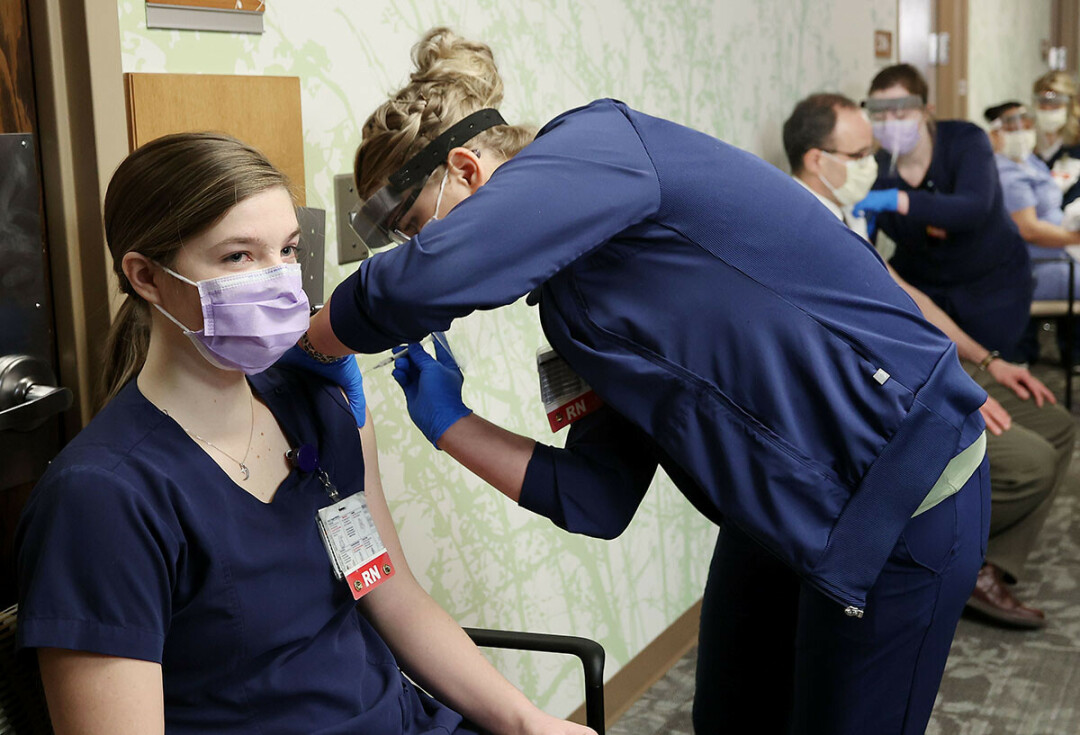Roll Up Your Sleeves: COVID Shots Available to EC County Seniors Starting Jan. 25
teachers, food chain workers may be next in line for vaccine

The Eau Claire City-County Health Department announced Thursday that Eau Claire County residents aged 65 and older – as well as those in other eligible groups – can sign up for COVID-19 vaccination on a new website: bit.ly/covidvaccine-ec.
Vaccinations will be available to residents 65+ starting on Monday, Jan. 25, the department said in a media release.
However, considering the state receiving only about 70,000 vaccine doses per week, health officials caution that the rollout of the vaccine will be slow. Consider, for instance, that there are more than 1 million people 65 and older in the state, and about 170,000 in that age group in Eau Claire County alone.
“The simple math of that mismatch is probably readily apparent to everybody,” Health Department Director Lieske Giese told reporters during a streaming press conference Thursday afternoon.
While there are currently no county-specific statistics on vaccination available, Giese said her department receives 300 vaccine doses a week. Other health care entities in the county also get their own supplies of vaccine, but Giese didn’t know exactly how many doses they receive.
Statewide, according to Department of Health Services data, about 52,000 people have been fully vaccinated, while about 176,000 more have received the first dose of the two-shot vaccine.
Meanwhile, as of Thursday there have been 10,233 confirmed COVID-19 cases in Eau Claire County – which means that, within a few days, 1 out of every 10 county residents will have contracted the virus. As of Thursday, there had been 95 deaths in the county, 5,607 statewide, and more than 400,000 in the United States.
Some Metrics Moving the Right Way
Not all the local statistics were dire, however. According to the latest weekly list of metrics released by the Eau Claire City-County Health Department, several key data points have dropped from the “highest risk” to the “moderate risk” category. For instance, the share of COVID-19 tests in the county that are positive over the past two weeks has fallen to 9.7%, which Giese described as a “welcome improvement.” As recently as November, that figure had topped 20%. Meanwhile, ICU beds are now 89% full; when virus cases surged in November, the number had approached 100% in the region.
Until vaccination of 65-and-older people begins Monday, only frontline healthcare workers, nursing home and long-term care residents, and fire and police personnel are eligible to receive the vaccine in Wisconsin.
The state Department of Health Services is expected to decide soon who will be added to the eligible list. The State Disaster Medical Advisory Committee voted this week to add several additional groups of people to so-called Phase 1B of the vaccine rollout. The Milwaukee Journal Sentinel reported on Wednesday that the recommended groups include:
- All teachers and staff for K-12, and student-facing teachers and staff for post-secondary institutions
- Food chain workers, such as grocery workers, agricultural workers and food pantry staff
- Prisoners and correctional workers
- Public mass transit workers, such as bus drivers
- Child welfare workers and social workers
- 911 dispatchers
- Frail elders and adults with disabilities in Wisconsin's IRIS and Family Care programs
- Mink farmers
However, the state Department of Health Services will have the final say on which groups are added to Phase 1B. (Learn more on the DHS website.)
Here are some questions and answers from the health department about the COVID-19 vaccine, who is eligible to receive it, and how they can make appointments:
Who is currently eligible for COVID-19 vaccine in Wisconsin?
Vaccine appointments are available for people who in frontline health care, other direct patient care, EMS, as well as police, fire, and corrections personnel. Beginning January 25, Wisconsin residents ages 65 and older are also eligible for the COVID-19 vaccine.
How do I get a COVID-19 vaccine?
• If you are in one of the eligible groups, visit bit.ly/covidvaccine-ec to find information for Eau Claire County locations that are currently scheduling vaccine appointments. The site will be updated as new vaccinators have availability.
• If you are already a patient at HSHS/Prevea, Marshfield Clinic Health System, or Oakleaf Clinics, please contact the health care provider where you are already a patient. Mayo Clinic Health System patients will be contacted by their healthcare provider when they are eligible for a vaccine appointment. There are other options for people who are patients at other clinics or do not have a healthcare provider.
• If you do not have internet access, please call your local health provider to schedule an appointment. If you do not have a health provider, you can leave a message at the Eau Claire COVID-19 Call Center and someone will return your call: (715) 831-7425
How soon can I get an appointment?
• There are more than 16,500 individuals ages 65 and older who are newly eligible to get vaccine. The number of appointments available will be based on how many doses each vaccinator gets each week. Note that there will not be enough vaccine supply to meet the demand for some time. All vaccinators are working as quickly as possible to vaccinate soon after they receive new shipments of vaccine.
• Signing up online will be the quickest way to get an appointment. People who are unable to sign up online may call for an appointment for any location. It is expected there will be long wait times on phone lines to schedule an appointment.
The COVID-19 vaccine is not available to additional groups at this time. COVID-19 has more severe consequences in older adults and prioritizing this population will help protect more Wisconsinites from serious illness and death. For more information about COVID-19, visit covid19eauclaire.org.


















